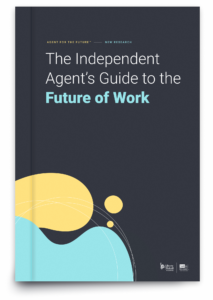Several years ago, I was shocked to learn that only around 30 percent of U.S. employees felt engaged at work. In the years following that realization, I set out to increase employee engagement in my agency, and I shared some of my tips for doing so with Agent for the Future.
That was in the days before COVID-19, and while much has changed in my agency since then, many of the shifts brought by the pandemic only reinforced my approach to employee engagement and human-centered leadership.
Center around your people
I’ve always sought to build my agency around the people who are in it, because everything else flows from that.
If you take care of your people, your people take care of the clients. They take care of the business. They feel respected. They feel trusted. They feel like part of the team.
After a strange and difficult year, it’s more important than ever before for business owners to care for our employees and lead with empathy. Gallup’s 2021 State of the Global Workplace report found that 57% of workers in the U.S. and Canada said they felt stressed on a daily basis. And according to a study by TELUS International, 80 percent of workers said they would consider quitting their current job for a job that focused more on employees’ mental health.
So how do we create more human-centric workplaces?
Encourage flexibility and a healthy work-life balance
At Harbor/Brenn, we’ve long valued flexibility. I’ve always been less concerned about having a body at a desk for eight hours a day and more concerned with the job getting done – whenever and wherever that needs to happen.
Since the pandemic hit, our ideas about flexibility became even broader. Most of our employees were working entirely remotely, and some had kids who were at home attending virtual school. Not everyone could do the traditional 9 to 5. With all the upheaval in the world, everyone was much more understanding and flexible with their co-workers.
Personally, I found that the pandemic forced me to slow down, and once the initial weirdness wore off, it was nice to be less busy. As events start to pick back up, I want to find a healthy medium between working hard, being out in the community giving back and still having time for myself and my family and the people who are important to me.
If I’m building structures for work-life balance for myself, I need to make sure I’m doing that for the employees at my agency, as well – making sure they are not burning out, that they feel the freedom to say “no” to taking on more.
Focus on leading behavior, not KPIs
Instead of setting top-down goals for individuals, I ask employees to think through what kinds of things they want to do more of and come up with their own goals – ideally tied to larger corporate goals. This requires buy-in and intentionality.
Rather than focusing on the end results, the goals focus around the leading behaviors that will generate results.
End-result KPIs can be a lagging indicator, while leading behaviors show what’s happening right now.
For example, I have an employee who really enjoys having conversations about life insurance. She wants to have more of those conversations, which will lead to more policies sold. So her goal might sound like, “I want to have five conversations a week about life insurance.” Another employee goal might be, “I want to send out 15 handwritten thank you cards to customers.” Those kinds of things are fun to do, and will lead to results, but we don’t necessarily think about them when we’re in the rush of daily work.
This approach seems to be working. We’re not a huge brokerage, but we’re doing really well. In addition to COVID-19 last year, we also had to deal with a major auto insurance reform in Michigan. I was backup for phone calls, and I was fielding 20 phone calls a day for people calling to ask what was going on. It was the busiest I’ve ever seen this agency, and yet, we survived and provided value to our customers. Between that change and COVID-19, I was projecting some grim numbers for last year. But we far surpassed what I budgeted for.
Invite your team to dream with you
When making any big business decisions, I try to take six stakeholders into account: employees, customers, owners, the community, carriers, and the environment. I try to balance those six stakeholders and make business decisions that elevate all of them instead of taking away from one in order to give to another.
In order to balance those effectively, I need feedback, I need input. I’ve learned that the people I work with often have much better, much cooler ideas than I do.
If I try to invent a new policy or way of doing business all on my own, it’s not going to be nearly as good as if I sit down and brainstorm solutions with my team.
For example, a few years ago, we decided we wanted to make our agency more environmentally friendly. We gathered the team to brainstorm ideas, and there were so many things that got mentioned that I never would have thought about. That meeting got the whole team excited about the changes because they were involved in the process.
Listening to employee feedback became even more important during the pandemic. Earlier this year, I wanted to figure out how to create a “new normal” for Harbor/Brenn moving forward. I knew I couldn’t just set a date and mandate that my staff all start coming into the office again. So I asked all my employees to consider what their dream work life would look like. I can’t guarantee that I’m going to be able to give everyone their dream world, but it wouldn’t make sense for me to build a new normal if no one wanted to live in it.
In the face of so much disruption, we agency leaders have an opportunity to make some big changes. Invite your staff to dream with you: “How do we want to interact with customers? What do we want to structure our work and our office? How do we want to interact with our companies? How do we want to engage in our communities?”
Listen to their answers and invite your people to help you build a better future – together.






